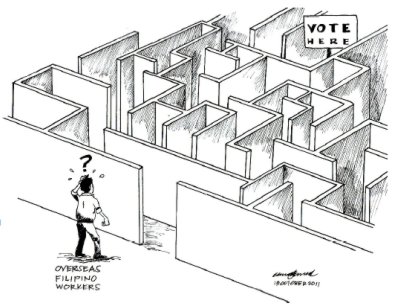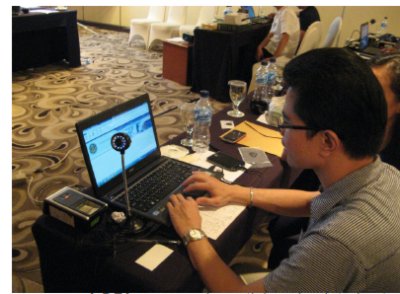| |
.. |
|
Overseas
Filipino Voters (OFV) Registration Kicks off with Training
of Diplomats and
Improved Procedures
|
|
by Eric Jude O. Alvia, NAMFREL Secretary
General |
|
from
NAMFREL Election Monitor Vol.2, No.22
|
|
. |
|
In a move to solve recurring problems in
the overseas absentee voting (OAV) system, the two Congress
Committees on Suffrage and Electoral Reform and the Commission on
Elections held in September a multi-sectoral forum to draw up plans
to address the low Overseas Filipino Voter (OFV) registration and
declining voter turnout. |
 |
Comelec aims for a voter registration turnout of one million for its
OAV for the 2013 midterm polls out of the 2.4 million potential
voters worldwide. Currently, there are only 351, 273 Filipino voters
registered overseas. There were 589,830 total registered overseas
voters for the 2010 elections, while there were 504,124 for the 2007
elections. Those who failed to vote for two consecutive elections
are
automatically deleted from the roster of qualified voters and should
register again when registration starts on November 2.
The poll body is looking at several ways of encouraging voter
participation abroad. Among the solutions is to provide ease and
convenience to OFVs by setting up mobile registration centers to be
manned by embassy and consular personnel and implement voter
registration using biometric capture. OAV registration through the
internet is also being mulled.
|
|
Training diplomats as voter registration
officers
The Comelec and the Department of Foreign Affairs (DFA) commenced
their preparations this October to train foreign posted diplomatic
personnel to orient them in voter registration with the use of
recently acquired digital capture machine (DCM) system (see
Notices of Award).
During the first week of October,
personnel from 15 diplomatic posts in South East Asia and South Asia
converged in Jakarta, Indonesia for an On-Site Regional OAV
Registration Training conducted by the Comelec team of Commissioner
and OAV Committee Chair Armando Velasco and Commissioner Augusto
Lagman. The training was hosted by the Philippine Embassy in Jakarta
represented by Ambassador Ma. Rosario Aguinaldo. Simultaneously, a
training was also held in San Francisco, USA with Commissioners Lucenito Tagle and Christian Robert Lim leading the training team.
. |
During the training, Comelec officials distributed to the
representatives of the various diplomatic missions the DCM biometric
technology equipment to enhance voter registration.
For the second week of October, the Comelec scheduled training for
36 consuls and attaches from 18 diplomatic posts in the Middle East
and Africa in Dubai, United Arab Emirates. Commissioner Elias Yusoph
and Philippine Consul-General Benito Valeriano opened the OAV
Training on the Resumption of Continuing Registration program.
Other teams have similarly trained diplomatic posts in Hong Kong and
Milan, Italy. Upcoming schedules include France on October 23 and
the United Kingdom on the 26th for an information drive and voters
education activity.
Registration schedule moved
As the training progressed, Comelec moved the registration period
from the original schedule of October 31 to November 2 since October
31 was declared as a special non-working holiday. |
 |
A
DFA
personnel
practicing
simulated
voter
registration
encoding
data
using
the
new
VCMs
in
Jakarta. |
|
|
.
Applications for registration shall be filed before authorized Comelec representatives at Embassies and Consulates that have
jurisdiction over the places they temporarily reside in. Applicants
need only to present their valid Philippine passports or Seaman’s
Book for seafarers when they register. The OAV registration period
will run from November 2, 2011 until October 31, 2012.
Weak information campaign
Despite these efforts, some Filipino migrants' rights groups such as
Migrante, expressed doubt that the poll body and the OAV secretariat
can start the registration of overseas voters on November 2, given
the late training of its election officers. They also exhorted the
Comelec and the OAV Secretariat to conduct a massive
information drive and education campaign abroad in preparation for
the OAV registration.
Some Philippine posts, particularly in the Middle East, have not yet
started an information drive and education campaign. An information
drive is needed to raise awareness among OFWs regarding the need to
register or validate their previous registration. It pressed the
Comelec to utilize its budget intended for dissemination of
information on election laws, rules and regulations, and continuing
voters' education to attain a higher number of registered voters
beyond the one million registrant target.
Low voter registration, much lower turn out
The number of registered OFVs pales in comparison to the close to 11
million Filipino workers abroad. During last year’s
presidential elections, only 153,323 or just 26% voted out of the
589,830 registered overseas Filipinos. This is a far cry from the
turnout in 2004 when the OAV was first implemented. A record-high
voter turnout of 65% was achieved, where 233,092 out of 359,297
participated in the elections. In 2007 however, turnout plunged to
16% when only 81,732 out of the 503,896 registered voters voted.
During the training, the participants identified the factors
negatively affecting voter registration: requirement to execute an
Affidavit of Intent to Return; geographical location of voters
vis-à-vis the registration centers; apathy; high mobility of
overseas Filipinos; limited manpower in embassies and consulates;
insufficient information campaign, and incorrect addresses provided
by the voters.
Among these factors, the requirement to execute an Affidavit of
Intent to Return was singled out as the most significant obstacle to
increasing OFV registration.
Other migrant groups and poll watchdogs also cite the following
problems that have plagued the OAV
implementation: weak voter education campaign; unresolved issues
with the several voting methods which resulted in OFVs being unable
to exercise their right to vote; the focus on increasing voter
registration but no plans on how to increase voter turnout and
expanded postal voting without addressing wastage of postal ballots;
the certified list of overseas absentee voters (CLOAV) remained
inaccurate with seafarers composing the majority of those
disenfranchised.
The DFA, which heads the OAV Secretariat, has also cited other
factors which contributed to a declining turnout. One major cause
would be the mobility of overseas Filipino workers. It cites that
workers transfer but fail to inform the Embassies or the Consulates
General of their new address.
On the aspect of administering the OAV, Commissioner Velasco
identifies the absence of an agency dedicated to handling the
implementation of the OAV as affecting its focus and continuity.
Proposals arrived at to improve registration &
turnout
Amendments to the OAV Law
While the problems cited can be addressed by improving processes and
procedures, there are those that require the amendment of the
Overseas Absentee Voting Act of 2003 (Republic Act No. 9189).
The scrapping of the affidavit of intent to return where Filipinos
abroad are required to return to the Philippines three years after
they have registered, or otherwise face disenfranchisement and jail
time of up to a year is seriously being eyed. The affidavit could be
detrimental to their applications for permanent residency or
immigrant status in their adoptive country. Filipinos who are
permanent residents or immigrants in other countries and who want to
register for OAV must first submit a formal written promise to
resume residence in the Philippines within three years from approval
of their registration.
However, like any previous election preparation, time is not on our
side. The amendment should be passed by Congress at least six months
before the 2013 elections, in order to give Comelec enough time to
embark on an information campaign and encourage more OFVs to
register.
Filipinos abroad such as Atty. Rodel Rodis of the US Pinoys for Good
Governance (USP4GG) explained that the 2006 Supreme Court decision
to enfranchise dual citizens by removing the residence requirement
should also extend to permanent residents under the principle of
equal protection of the law.
Adopting technology for inclusive, efficient, and secure
registration
Other groups are looking at ubi quitous technology such as the
internet and social networking. Conducting internet
registration (and possibly voting) to reach Filipinos world-wide is
a popular solution.
Victor Barrios of Global Filipino Nation and Tony Villegas of USP4GG
recommended registering and voting via internet to save on costs and
to address the challenges of high mobility among Filipinos and the
physical distance of the embassies and consulates from would-be
voters.
They further suggested that registration be made a continuing
process even as cut-off dates for particular elections are observed.
Any voter registered after the cut-off date for a coming election
will not be eligible to vote in that election but in a succeeding
election.
Other proposals include using peer and family influence by
encouraging their friends and family members to register and vote
using Facebook and other social media.
To improve voter turnout, Congress is currently debating on the
adoption of an online voting system. A big concern is that sanctity
of the ballot might be compromised in internet voting, and that
implementers (primarily the Comelec) may not be prepared to rely on
technology for this purpose. |
|
|
| |
.
.
. |
|
| |
| |
|
|

